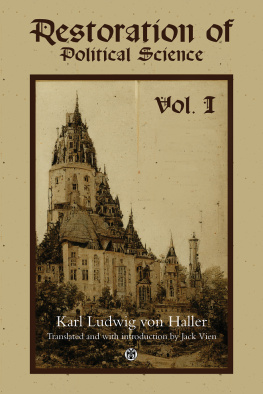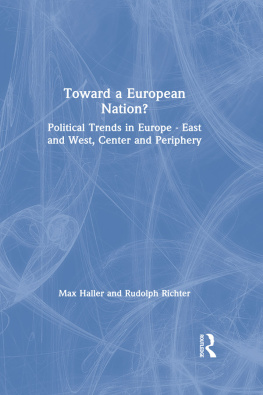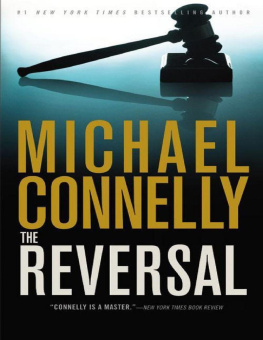First published in 1930 by George Routledge and Sons, Ltd.
This edition first published in 2020
by Routledge
52 Vanderbilt Avenue, New York, NY 10017
and by Routledge
2 Park Square, Milton Park, Abingdon, Oxon OX14 4RN
Routledge is an imprint of the Taylor & Francis Group, an informa business
1930 J. Haller
All rights reserved. No part of this book may be reprinted or reproduced or utilised in any form or by any electronic, mechanical, or other means, now known or hereafter invented, including photocopying and recording, or in any information storage or retrieval system, without permission in writing from the publishers.
Trademark notice: Product or corporate names may be trademarks or registered trademarks, and are used only for identification and explanation without intent to infringe.
British Library Cataloguing in Publication Data
A catalogue record for this book is available from the British Library
ISBN: 978-0-367-02813-8 (Set)
ISBN: 978-0-429-27806-8 (Set) (ebk)
ISBN: 978-0-367-24366-1 (Volume 18) (hbk)
ISBN: 978-0-429-28207-2 (Volume 18) (ebk)
Publishers Note
The publisher has gone to great lengths to ensure the quality of this reprint but points out that some imperfections in the original copies may be apparent.
Disclaimer
The publisher has made every effort to trace copyright holders and would welcome correspondence from those they have been unable to trace.
INTRODUCTION
To many I may seem to be embarking on a remarkable enterprise in proposing, as it might appear, to treat in this small volume of the whole of Germanys historya subject which might well claim ten times as much space without any fear of excessive prolixity. But to attribute this intention to me would be to misunderstand me. I do not want to write on German history but to talk about its epochs.
What is meant by an epoch is, of course, a period in which some fresh beginning is made, some fresh determining element enters, some event occurs to give a new direction to the course of history. Events of this sort we describe as epoch-making or epochal. By an extension of the sense of the word the whole period dominated by the after-effects of such an event is called an epoch. Anyone who will keep in mind these senses of the word will know what I am aiming at. We are concerned with the critical moments of German history, the turning points in its course. Those are what we want to consider, and also to select as points of vantage from which we may survey the development of the German nation, viewing the panorama section by section.
A simile may help to illustrate my meaning. The course of history is never that of a straight line; it has no resemblance whatever to that of a canal or a railway line, but a great resemblance to the course of a river. As with a river, it is only exceptionally that historical development proceeds directly in the straight line of any path entered on. It proceeds by constant turns and windings, often in bizarre hooks and bends, and not infrequently the original direction is abandoned for a time or even for good and all. The turning points may be evident and conspicuous. In French history, for instance, everyone can see at a glance the significance of the year 1789, or of the entry on the scene of Richelieu; in English history the years 1066 and 1688 are landmarks visible from afar. But this is not necessarily the case; the epochs are not always so plain for all to see. The change may set in gradually, or the development be arrested, it may be concealed for awhile, may continue underground, just as a stream may be held up, may broaden to a lake or a marsh, perhaps ooze away altogether, to reappear at another spot. Thus, any historical survey which aims at a connected view of the whole process must first of all ascertain the critical turning points, must appreciate the moments when the new begins, the old is abandoned, the direction changes.
Every fresh turn has its causes. The river, too, does not abandon the straight lines out of caprice: following the law of its own gravitation, it seeks out the lowest spot. Often in doing so it has to get round an obstacle, sometimes it must pile itself up before it overcomes it; or the influx of a big tributary alters its form and adds to its force, so that it can carve its bed out of a spot that otherwise might have diverted its course.
I need not pursue the comparison further. Anyone who knows anything of history is well aware that the development of a nation is largely determined by outside influences. The emergence of a more powerful neighbour may drive it underground, like a rocky barrier or a ridge of sand; the disappearance of the rival may leave its path clear once moreto say nothing of the growth in power through conquest or annexation, or through the achievements of some great personality, which will give fresh zest and new directives to the ambitions and the efforts of a great nation.
There is bound, it seems to me, to be a peculiar fascination for all who have any historical sense, who feel, that is, the need and have the capacity to bury themselves in the past, in following in this way the course of the history of their own people, discovering the critical turning points and attaining a clear conception of the causes operating at each stage. But this pursuit not only has its fascination, it is a necessary and an indispensable one. In view of the mass of materialincidents and personalitiesoffered by past history, there is always a danger of failing to see the wood for the trees.
It is not enough to be acquainted with the facts, they have to be understood, their significance rightly gauged in relation to one another, their proportion to the whole story assessed. This is not so easy as it might seem. There are many who possess a rich store of knowledge, but an inspection of it shows something like an untidy drawer, for want of the needed general grasp and ordering of the accumulation. How often one may ask a well primed candidate, familiar with the history, for instance, of Frederick the Great, what was the point in German history at which dualism between Prussia and Austria had its origin, and receive no answer at all or only a hesitating and diffident one ! In this instance the question is a comparatively simple one. It is less to be wondered at if a ready answer is not forthcoming to the question when and how German particularism came into being. That, certainly, is not altogether an easy question to answer, and yet it has reference to a matter of the utmost importance, a peculiarity of the German nation which has seriously handicapped it from the outset in competition with its neighbours, like a racehorse with a heavy rider. And here is one more question, of equal importance, which I should not venture to put to any candidate, since it was put to me once by a fellow-professor of history who was himself unable to supply the answer: whence did the denominational cleavage in the German people originate? That it dates from 1517 is a fact which everyone knows; but why did it come, what made it possible? It cannot have been in the natural order of things, since the other European peoples have had no experience of it, or at all events nothing comparable with it in magnitude; in other countries it plays no part of the slightest significance, whereas right down to our own day it has absolutely dominated German history. How comes this? English, French, Spaniards, all had their share of the religious struggles of the Reformation period, but they healed up the cleavage; the Germans were either unable or unwilling to do so. Why? Here everyone is familiar with the epochal event, but very few seem to be acquainted with the reasons why it followed its unique course.












